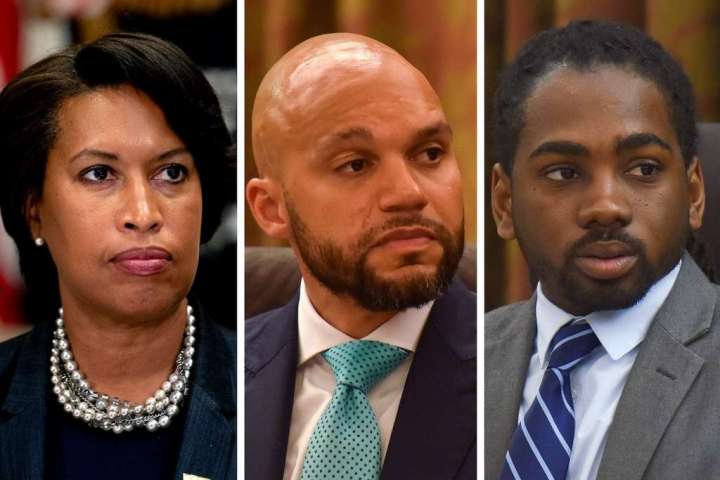The June 21 D.C. Democratic primary ballot sets out a buffet of choices.
What are D.C. voters hungry for as primary day approaches?

Let’s look at a few on the plate.
The array of mayoral candidates includes a two-term, battle-tested incumbent, two D.C. Council members and a former advisory neighborhood commissioner, who, The Post reports, is a former attorney who was disbarred in 2009 over allegations of fraud and neglect — and whose reinstatement application was denied in 2017.
The candidates are distinguished by their differences.
Mayor Muriel E. Bowser has a pragmatic approach to problems, accompanied by a “my way or the highway” governing style. Both have marked her seven-plus years of service with successes, stumbles and some low-grade tumult.
Bowser earns well-deserved high marks for firm, steady leadership during the covid-19 pandemic, and her stellar representation of the city on the national scene. Bowser is also the face of public education and public safety in the city, because she has chosen to make it so. Key deputies often come across as stagehands. That has understandably made her accountable for the academic achievement gap and an increase in violent crimes. But she hasn’t earned failing grades.
As covid has receded, schools are being stabilized and enrollment is growing. Resources are being directed at academic shortfalls. The police chief, thanks to the mayor’s push, is getting more officers that he claims to need.
The difficulty with judging Bowser’s administration overall is in measuring actual performance against promises and press releases. Production of affordable housing, delivery of community-based social services, crime-reduction programs? There are all well-laid-out plans on paper. But positive results — independently and expertly verified — are hard to come by. Meanwhile, election-year contracts and grants are flowing out of the D.C. treasury to meet every human, commercial and economic need imagined by Bowser’s politically minded economic development team.
Which gets us to Bower’s two elected competitors: Trayon White Sr., Ward 8 D.C. Council member since 2017, and Robert C. White Jr., at-large D.C. Council member since 2016.
There is no plausible reason to predict Trayon White’s election as D.C. mayor, this year or any year soon. There is no credible case for his candidacy other than perhaps vanity or a desire to help Bowser by drawing anti-Bowser voters away from Robert White. Trayon White must know it, too, judging from the effectiveness of his campaign.
Robert White, on the other hand, has now had years of public service in which to demonstrate a capacity to manage an $18.4 billion D.C. government budget. He has been better at tackling the job of criticizing Bowser for her handling of housing, gun violence, schools and other issues.
Aiming higher, Robert White has made himself the top bidder for the mayor’s office. He has said that if elected mayor, he will guarantee a job for any D.C. resident who wants one. Estimates are his program will add about 10,000 positions to the city payroll and cost an estimated $1.5 billion a year. A “significant expansion,” White acknowledges, but it would produce community services across the city.
White doesn’t stop there. Claiming the city has a “school-to-prison pipeline,” White is proposing a dramatic expansion of vocational education and a network of public boarding schools for children with “a 24-hour academic support environment.”
Not so fast: White is right about young people being disconnected from school. He’s right about children struggling with family instability, neighborhood violence and no one to help with homework or, as he puts it, “social emotional needs.” But boarding schools? That plan needs work. Still, White has put his finger on a problem that has been skirted for far too long.
Bowser as mayor is a known quantity. Robert White is a gamble. Worth taking?
That calculus doesn’t apply to the nomination for council chairman.
Phil Mendelson, chairman since 2012, is like an old shoe: familiar, agreeably unpretentious and occasionally irritating when he won’t bend when he should.
His strength is council stewardship, which is akin to herding feral cats. But Mendelson chairs a current council with more showhorses than workhorses. Oversight isn’t as vigorous as it should be.
Still, Mendelson’s opponent, first-time council-seeker Erin Palmer, has an uphill battle. She has citywide territory to cover and not much time in which to do it. An even larger challenge will be making a case for herself based upon her knowledge of the city and the job.
At-large D.C. Council member Anita Bonds finds herself in a familiar, and desirable, position: a crowded field. It’s an open question whether the nine-plus-year council veteran can pull off the “elder mentor” status that has served her so well in past elections. Her work as chair of the housing committee has opened her up to criticism that oversight of housing agencies has gotten away from her. Three challengers — Nate Fleming, Lisa Gore and Dexter Williams — are campaigning with energy and determination seemingly unmatched by Bonds.
But with almost a month to go, there’s still time.






